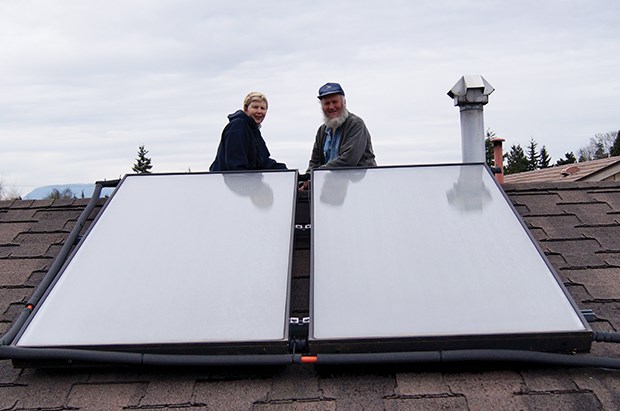Rob Baxter, co-founder of Vancouver Renewable Energy, which installs solar panels on new and existing homes throughout the Lower Mainland, says it’s making more sense to look to the skies for home energy.
Rising energy costs and a growing desire to live more eco-friendly lifestyles has spurred interest in solar panels to power our homes. Although solar panels have been around for quite some time, only recently have homes cloaked in photovoltaic panels, aimed at capturing the rays of the sun, begun to be so visible.
“Solar panel prices have been coming down and it’s becoming more popular. Our business has really grown in the past three years compared to the 10 years prior,” said Baxter.
So far, however, most of his installations are ordered by environmentally-minded residents, as the financial windfalls are not quite the same as they are in other parts of the world.
“We have some of the cheapest electricity prices in the world. Most people installing panels are doing it for the environment,” said Baxter.
One of those environmentalists is Coun. Harold Steves.
“If we covered all of Metro Vancouver houses with solar panels we wouldn’t need the Site C dam” for future power needs, said Steves.
Now, even as power costs in B.C. remain low, you still won’t lose by installing panels, noted Baxter.
“Here, you’re still going to get a return on your installation, over the course of the warranty” of the panels, said Baxter.
“And as energy costs go up, it will become more viable financially,” said Baxter.
As it stands, a $30,000 unit will save a single-family homeowner about $150 in energy costs per month.
Baxter said the average home installation is $20,000.
In the summer it is likely that a home may be selling power back to the grid.
His company arranges for safe installation and fills out necessary paperwork with BC Hydro.
One of the barriers with solar panels is power storage. Baxter said companies aren’t focused on Canada yet, where power grids are relatively stable.
“We don’t see many blackouts,” he said.
Only about 10 per cent of his clients opt for a battery storage system, he said.
Solar Q&A
How does solar energy work?
Solar energy is turned into electric power through the photovoltaic (PV) cells located in the solar panels. The PV cells transform sunlight into direct electric current. An inverter built into the system converts the DC electricity into the alternating current (AC) that powers homes. The AC is sent to the home’s electrical panel and used to power lights and other devices.
What happens at night?
Unless a home is self-contained and off the grid, the average homeowner will not have to worry about night usage or batteries to store energy. He or she will continue to use energy off the traditional electrical system at night. Many electrical costs will be offset by the amount of extra solar energy put back into the grid. There are a variety of programs, and some homeowners may even reverse bills further based on how much electricity is generated.
Solar panel needs:
Although it is ideal to have a south-facing location for panels, this is not an absolute necessity.



